- Home
- Neal Asher
Line War Page 2
Line War Read online
Page 2
This thing was quite obviously a ship of some kind. Thirty feet long, it was curved like the head of a spoon. Its exterior was silver-green fading to black at the edges, and it bore patterns like umber veins running through its surface. Silently it landed inside the city, in which it was now possible to see those weird tentacular growths every few hundred feet, and also humans, hijacked like the blind woman, stumbling through the ruins bearing makeshift weapons. It was a vision from hell, as they slaughtered other survivors with sickening regularity. And when the newly arrrived ship opened up and a figure stepped out, it seemed as if the arch-demon himself had arrived to oversee it all.
From a distance the bizarre humanoid seemed wholly of metal–just like a Cybercorp metalskin Golem. But closer inspection revealed that its shiny blue-green exterior was without visible joints, and stretched and contracted over its frame like a living skin. The android towered tall and was incredibly thin, and its outstretched fingers resembled a spider’s legs. The head slanted abruptly back at the forehead, and tapered sharply down to the lipless slot of its mouth. It had no nose and the eyes were lidless and insectile.
It walked from its spacecraft towards a nearby rubble pile, and there stood waiting. One of the tentacles uncoiled from the smoking mass of shattered foamstone and girders and arched over until it was only a few feet from the humanoid’s face. The tip of it split into three prongs then froze. After a moment the prongs closed up again and the tentacle retracted into the rubble. The humanoid swivelled round and headed back to its vessel.
Cherub assessed what he had just seen, and it struck him as likely that the brutal slaughter in the city was almost of peripheral concern to something capable of deploying technology like this. Sure, if you are going to attack, you take out the AI and the runcible first, but a few surviving burn victims should be somewhat irrelevant. He gazed at the activity continuing amid the rubble. Of course, by destroying the AI you would be wiping out a massive source of information. Cherub felt certain that what he had been witnessing here was a data-gathering exercise–and that the data gatherers had just delivered their report.
The humanoid slid back inside its spacecraft, which immediately launched itself straight up, slamming to a halt in mid-air, before accelerating straight towards the spot where Cherub crouched. He remained utterly still, utterly reliant on his chameleonware to hide him. The ship sped overhead, then dropped low towards the fields of drastically modified plants that lay beyond. The android clearly had to be after something here, and he wondered what. This world was small and insignificant and, as declared in one of the AI’s information packets, ‘of no tactical importance’. Maybe Cherub would find out what it was seeking, since it was heading the same way he must go to reach the hothouses, where he hoped to find out what had happened to Carlton.
Seated in a viewing lounge aboard the giant spaceship Jerusalem, Agent Ian Cormac peered over at the object folded up in the corner looking like a chromed spider corpse, which was a close enough approximation to reality. Not a corpse, however, just self-deactivated and bored. Cormac well understood how the spider drone felt. Nothing was happening here and, if anything was to finally happen, he knew his most likely involvement would be to spectate from an acceleration chair and hope for the best. But though he too felt surplus to requirements, he was not bored, for he was having to get used to what seemed to be a whole new range of senses.
Another one…
He turned to gaze out of the large panoramic window ranged along one wall. The sensation he now experienced was difficult to nail down: maybe like a sudden pressure drop, a pulse of infrasound, or one of those night-time flashes of light caused by a stray cosmic ray striking the optic nerve, or perhaps an out-of-key note occurring in a symphony that he hadn’t until then even realized was being performed. No description seemed adequate. It was similar somehow to that sense of the ineffable he felt when a ship he was aboard dropped into U-space. However, this time it was directional, and he even got a sense of mass and shape. He instinctively knew, and had already confirmed such a feeling on numerous occasions, that another big dreadnought had just surfaced into realspace half a light year away. He could confidently point towards it, and sometimes felt that, with an effort of will, he could even step right over to it.
Cormac understood that there was still something odd now about his mind. In his final encounter with a psychopath called Skellor he had escaped a Jain substructure encaging him by stepping through U-space–a feat supposedly impossible for a human being. Driven to utter extremity, his brain penetrated by the alien organic Jain-tech that Skellor was employing to torture him, he had done just that. It was an ability he would find very useful to recover at times, but if it was contingent on what Skellor had done to him, then reaching that state was something he would rather avoid. He had subsequently tried to use the same escape route while being pursued by Erebus’s biomechs, but that time failed. It seemed, however, as if, like a runner confined to a wheelchair, he could still feel the track under his feet and the wind in his face.
He tried to dispel the disturbing feeling and return to the moment by using his gridlink to delve into the coms traffic in this highly active planetary system. Jerusalem–the AI controlling the huge ship he was currently aboard–had turned this system into a fortress. The nearby hot inhabited world of Scarflow was sheltered by huge mirrors which diverted the sun’s energy towards orbital installations. This energy in turn was, when the devastated Polity fleet arrived here after its disastrous encounter with Erebus, being converted into coherent maser beams projected towards a cold Mars-sized planet further out, so the same energy could be used in terraforming it. Upon the fleet’s arrival the percentage of energy being projected had been quickly reduced, the rest being stored for future use, while the coherent masers were at once prepared to be employed as weapons.
But Erebus had not come.
Erebus, which controlled a vast mass of biomechanoid ships, constructed using Jain technology, had effectively ambushed a fleet of Polity ships and wiped out much of it. Cormac had lost personnel and friends in that conflict. He’d actually hoped Erebus would turn up, but logically that would have been a daft move for the entity to make. Then, again, attacking a small fleet outside the Polity had not been so bright either. Though causing massive destruction, Erebus had done no more, tactically, than seriously piss off the Polity’s ruling AIs. Cormac still could not fathom why it had done so. However, he felt a deeper disquiet about the reaction on this side, in that it was only a reaction. The superintelligent AIs of the Polity should be proactive; they should become the predators in this situation, they should be doing something, yet it seemed to Cormac that they were just sitting on their hands, literally or metaphorically.
‘What are you thinking?’
He turned to see Mika–Polity scientist, companion and now lover–standing a short few paces behind him. He had not heard her approach, but maybe, on some subliminal level, he had known her to be there, but that level had not alerted his conscious mind fully to her presence. Did that mean he trusted her? Or was it that his new-found U-space awareness was distracting him, for even when there were no ships arriving, he received a constant niggling sensation from the runcibles perpetually in operation on the Polity worlds nearby.
‘The usual,’ he replied. ‘I can’t understand why Erebus did what it did, and I’ve even less idea what it is going to do now. It just makes no sense.’ Somehow, almost instinctively, he did not want to mention to her his reservations about the Polity AI response so far. Nor had he told her, or anyone, that he had recently become able, somehow, to sense U-space.
‘Not to you maybe–so surely that means Erebus is an enemy to be feared?’
‘Perhaps so,’ he said.
She wore skin-tight leggings and a loose pale green blouse–the sort of attire she always donned when ‘relaxing’. Her ginger hair was tied back, her angular face perfect, obviously having just been given a makeover by a cosmetic unit. Even the blush marks at her tem
ples were concealed–the ones caused by her physical connection to the virtual reality equipment she too frequenly used to study those two Dragon spheres out there in the void. In connecting herself to VR like that, rather than via internal hardware, she was in a minority, for she had yet to augment herself. It seemed to Cormac that just about everyone else around here either wore augs or was gridlinked. Only a little while ago some queries he had made through his gridlink had given him much to ponder. Until about four years ago the proportion of citizens opting for cerebral augmentation had averaged 46 per cent across the Polity. Over the last four years, since the depopulation of a world called Samarkand, that had been steadily rising, shooting up to 62 per cent in this quadrant of the Polity after the disastrous events on another world called Coloron, where an entire arcology had been obliterated to prevent the spread of Jain technology. This showed that people were scared enough to seek more individual power. He was suspicious of this ready abandonment of humanity but suspected he might be reading too much into it.
‘Jerusalem,’ he asked abruptly, ‘what is the AI assessment of Erebus’s method of attack?’
The AI replied instantly, probably turning only a fraction of a per cent of its attention towards this conversation.
‘We are puzzled,’ it admitted.
‘Why are you puzzled?’
‘For precisely the same reasons as you yourself. Erebus seems to have displayed all its cards before the game has even begun.’
‘See?’ said Cormac to Mika. He then gazed up at the ceiling, as most people did when addressing an AI whose precise location they did not know. ‘What about those objects in the asteroid field?’ Though Erebus’s entire mass of biomech ships had not appeared, something else had arrived out there not so long ago.
‘We have yet to find them. I suspect that they are merely devices to keep watch on us, since anything else would cause disturbances we would detect.’
‘Perhaps I should go out and take a look?’ suggested Cormac.
‘That will not be necessary,’ the AI replied firmly.
‘Cormac,’ agreed Mika, ‘there’s nothing for you to do at the moment.’
Yes, he thought, even entities with artificial intelligences a couple of orders of magnitude greater than mine don’t know what to do. He nodded, but just then he spotted Arach, the spider drone, slowly opening out his long metal legs and lifting his ruby-eyed head to survey his surroundings. The drone seemed to test the air briefly with his pincers before springing into a fully upright position: a chromed spider some five feet across. Arach now possessed a new abdomen–the original, equipped with automated weapons, having been left behind on a world near where the Polity fleet had been ambushed to help fend off Erebus’s pursuing ground-based biomechanisms. This new abdomen apparently contained a similar array of armament.
‘Something has occurred,’ Jerusalem observed.
Cormac realized that, for Arach would only have bothered waking up if there was a chance he would get to use all that new armament. Cormac resisted the urge to key into the local AI nets to find out what was going on. It all struck him as rather too convenient.
‘Tell me,’ he said, noting Mika’s expression becoming resigned and almost sad.
‘One of Erebus’s wormships has attacked a Polity world,’ Jerusalem replied.
‘Which one?’ Cormac asked, imagining one of the big ones, with a population in billions, now reduced to a smouldering ruin.
‘The choice of target is, again, puzzling.’
Arach was now doing his familiar tappity little dance on the carpet, obviously unable to contain his glee. Jerusalem was specifically informing Cormac about this and the spider drone was suddenly active…which must mean there was a situation that needed investigating without requiring an investment of battleships, major AIs or weaponry. Cormac was needed.
‘You know, I thought AI minds could work a hundred times faster than those of humans, but you’re going slow enough now to try my patience.’
‘Very well,’ said Jerusalem. ‘The wormship attacked a very minor world, of no tactical importance, called Klurhammon. As we understand it, the same ship has now departed, after wiping out a large proportion of the population and causing much destruction.’
‘Makes no sense.’
‘Precisely.’
‘And it needs looking into.’ Cormac found himself moving towards the door of the lounge, while Arach scuttled across to fall in behind him. Abruptly he halted, not liking his own unthinking reaction, then turned and strode back over to Mika.
‘You nearly forgot me,’ she said.
‘Will you come?’
Before Mika could reply, Jerusalem interrupted: ‘I cannot allow that.’
‘Why not?’ asked Cormac, gazing into Mika’s face and seeing she already knew the reason.
‘There are two Dragon spheres stationary nearby and, besides the AIs insystem, Mika is the nearest thing we have to a Dragon expert. Also…her presence would constrain you.’
It was true–he had already made that assessment–but he felt there was something else involved here. ‘And?’
‘Mika has a concord with Dragon–it communicates better with her than with anyone else here. She is therefore a valuable resource when it comes to communicating with that particular entity.’
Cormac accepted that, feeling rather ashamed at his relief.
‘Then I’ll see you when I return,’ he said to her.
They kissed, perhaps with a bit less passion than previously, but certainly with the same sincerity.
‘Goodbye, Cormac,’ she whispered. ‘Try to stay alive.’
He headed away, trying not to notice the tears glistening in her eyes. The door opened for him automatically, and soon he was striding through the Jerusalem’s numerous corridors, heading for the room he had been sharing with Mika.
‘Do you think there’s going to be violence?’ the spider drone asked eagerly as it scuttled along behind.
‘Shut up, Arach,’ Cormac replied.
Arriving at the room he went straight to a particular cabinet and from there removed only the two things he really required: a thin-gun he had grown accustomed to practising with and the wrist-sheath containing his Tenkian throwing star–a device long proved to have an erratic mind of its own. He headed straight out again without even looking at the other belongings gathered there.
‘I’d like to select my own team,’ he said as he strode along.
‘Those currently available have been notified,’ Jerusalem replied.
Annoying that the AI had probably already worked out exactly who he wanted to select.
‘And my own ship?’
‘The Jack Ketch III is unavailable, since it has yet to acquire any engines.’
Cormac halted, somehow getting an intimation of what was coming next. ‘Then what ship is available?’
‘The King of Hearts has been refitted, and is now prepped and ready for you.’
Great, the same AI attack ship that once went rogue and then had…a change of heart. Following this transformation it had rescued Cormac himself and those few surviving the debacle on the world where he had lost his comrade Thorn, his mentor Horace Blegg and many others. He didn’t at all trust the AI running that ship, but he guessed Jerusalem now intended for King to prove itself trustworthy.
‘Fine,’ Cormac replied. ‘Fine.’
He reached a drop-shaft and, programming it ahead of him through his gridlink, stepped into it and allowed the irised gravity field to waft him upward. Stepping out into another corridor, Arach clattering quickly behind, he found only one person awaiting him. The ersatz man was tough-looking with cropped black hair, brown skin and unreasonably green eyes. All emulation, for this was Hubbert Smith, a Golem android in the thirtieth production series.
‘Time to load up and ship out,’ announced Smith.
‘So it would seem,’ said Cormac. ‘Where’s your companion, Ursach Candy Kline?’
‘It would seem that our personal exper
ience of warfare with Erebus must be fairly distributed, so she shipped out of here about four days ago.’
Cormac grimaced and moved on.
‘How y’ doin’, Arach?’ said Smith.
‘Lock and load,’ the spider drone replied.
Cormac fought to stop his grimace turning into a grin.
‘What about Andrew Hailex?’ he enquired.
Hailex, like Smith and Kline, was another of those rescued by the King of Hearts. He was human and, when Cormac first saw him, the man had looked to be in his twenties, as most people chose to look since that option had become available in centuries past. Cormac knew him to be actually in his sixties and an experienced Sparkind combat veteran. The man had been utterly hairless and bulky. Grinned a lot.
Trying to find a replacement for Thorn?
No, Hailex had looked more like Gant, who had once been in Thorn’s Sparkind unit–another who had died during one of Cormac’s missions.
‘Hailex will not be joining us either,’ Smith replied. ‘He applied for a transference to agent training.’
Somehow that figured, and Cormac’s grimace returned in full force.
In one of the small departure bays a further individual awaited them. However, this one was neither human nor Golem but dracoman–a product of the giant alien entity called Dragon–and an example of what might have gone on to dominate Earth if only the dinosaurs hadn’t been wiped out. Dracomen were one of Dragon’s jokes, or lessons, or whims. They were as reptilian as their name implied: their skins were mostly tegulated with green scales, except from throat to groin where they were yellow. They possessed a leg structure and gait that was distinctly birdlike, faces jutting and toadlike, and huge eyes. Scar, one of the first of the dracomen to be created, now exposed his teeth in an expression that could be either a grin or a preparation to rip out someone’s throat. Admittedly, Scar might still grin while committing such a bloody assault.

 The Bosch: A Novella (Polity Universe)
The Bosch: A Novella (Polity Universe) Jack Four
Jack Four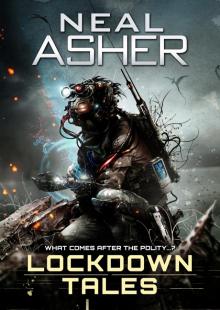 Lockdown Tales
Lockdown Tales The Warship
The Warship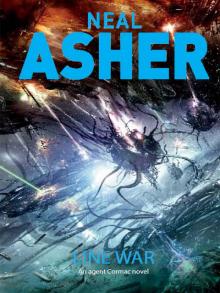 Line War
Line War Total Conflict
Total Conflict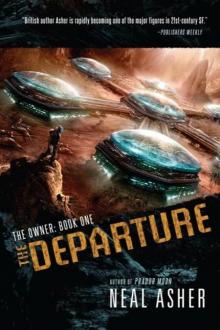 The Departure
The Departure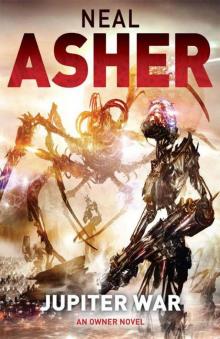 Owner 03 - Jupiter War
Owner 03 - Jupiter War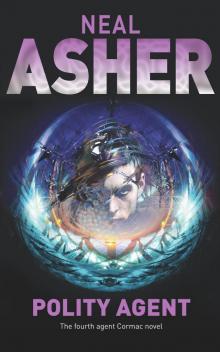 Polity Agent
Polity Agent Prador Moon
Prador Moon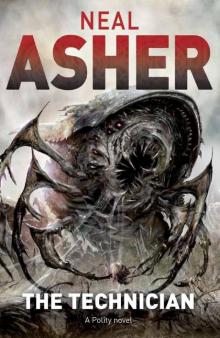 The Technician
The Technician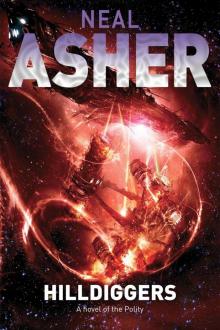 Hilldiggers
Hilldiggers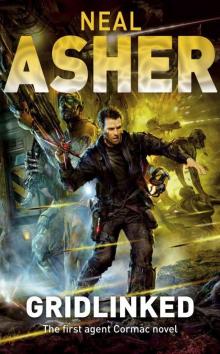 Gridlinked
Gridlinked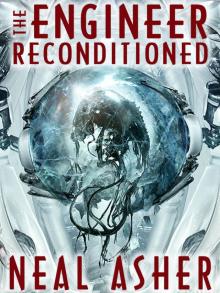 The Engineer ReConditioned
The Engineer ReConditioned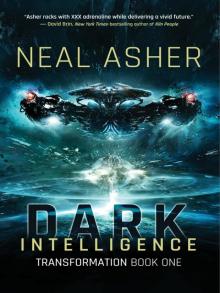 Dark Intelligence
Dark Intelligence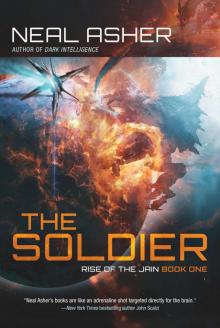 The Soldier: Rise of the Jain, Book One
The Soldier: Rise of the Jain, Book One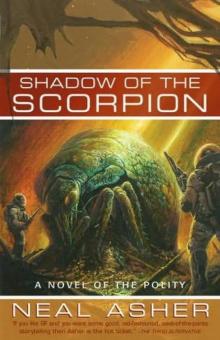 Shadow of the Scorpion p-2
Shadow of the Scorpion p-2 The Skinner
The Skinner The Soldier
The Soldier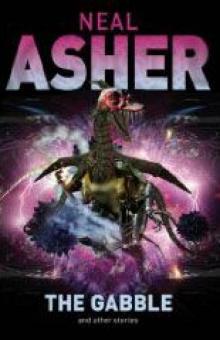 The Gabble p-13
The Gabble p-13 The Gabble and Other Stories
The Gabble and Other Stories The Parasite
The Parasite The Other Gun
The Other Gun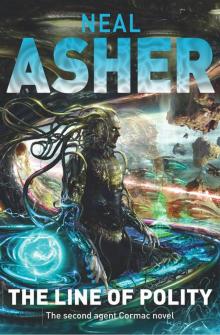 The Line of Polity
The Line of Polity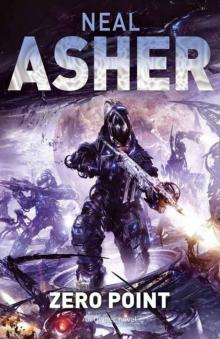 Zero Point (Owner Trilogy 2)
Zero Point (Owner Trilogy 2)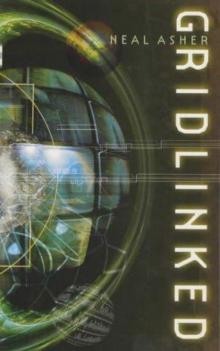 Gridlinked ac-1
Gridlinked ac-1 Prador Moon p-1
Prador Moon p-1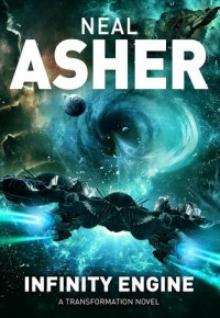 Infinity Engine
Infinity Engine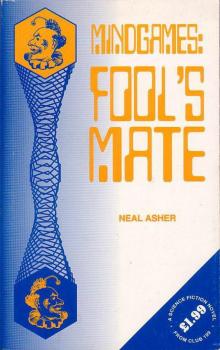 Mindgames: Fool's Mate
Mindgames: Fool's Mate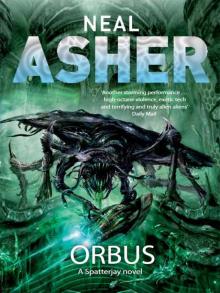 Orbus
Orbus Africa Zero
Africa Zero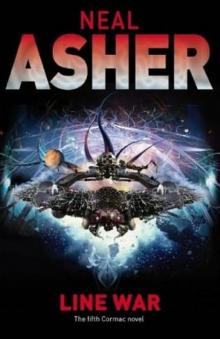 Line War ac-5
Line War ac-5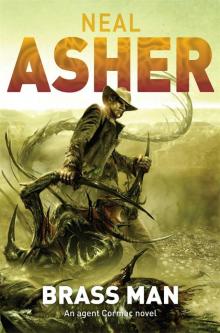 Brass Man
Brass Man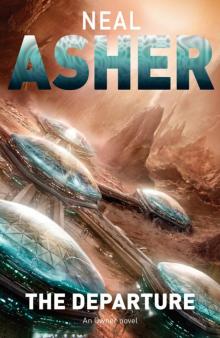 The Departure to-1
The Departure to-1 Cowl
Cowl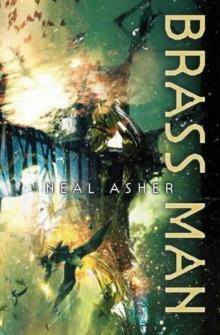 Brass Man ac-3
Brass Man ac-3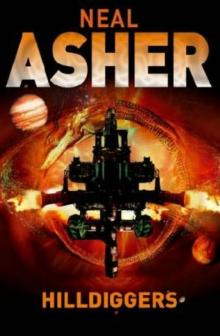 Hilldiggers (polity)
Hilldiggers (polity)![Greg Bear - [Eon Trilogy 1] - Eon (rescan) (v1.0) Read online](http://i1.bookreadfree.com/i2/04/08/greg_bear_-_eon_trilogy_1_-_eon_rescan_v1_0_preview.jpg) Greg Bear - [Eon Trilogy 1] - Eon (rescan) (v1.0)
Greg Bear - [Eon Trilogy 1] - Eon (rescan) (v1.0)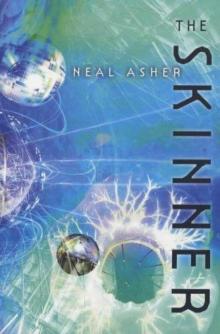 The Skinner s-1
The Skinner s-1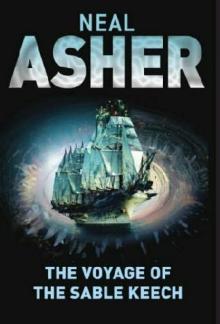 The Voyage of the Sable Keech s-2
The Voyage of the Sable Keech s-2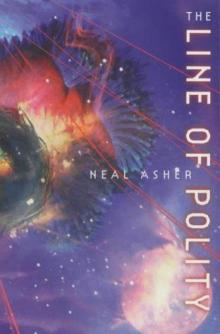 The Line of Polity ac-2
The Line of Polity ac-2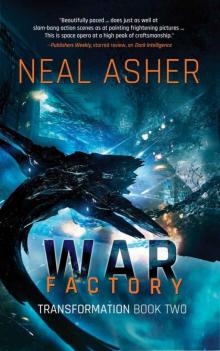 War Factory: Transformations Book Two
War Factory: Transformations Book Two Polity Agent ac-4
Polity Agent ac-4